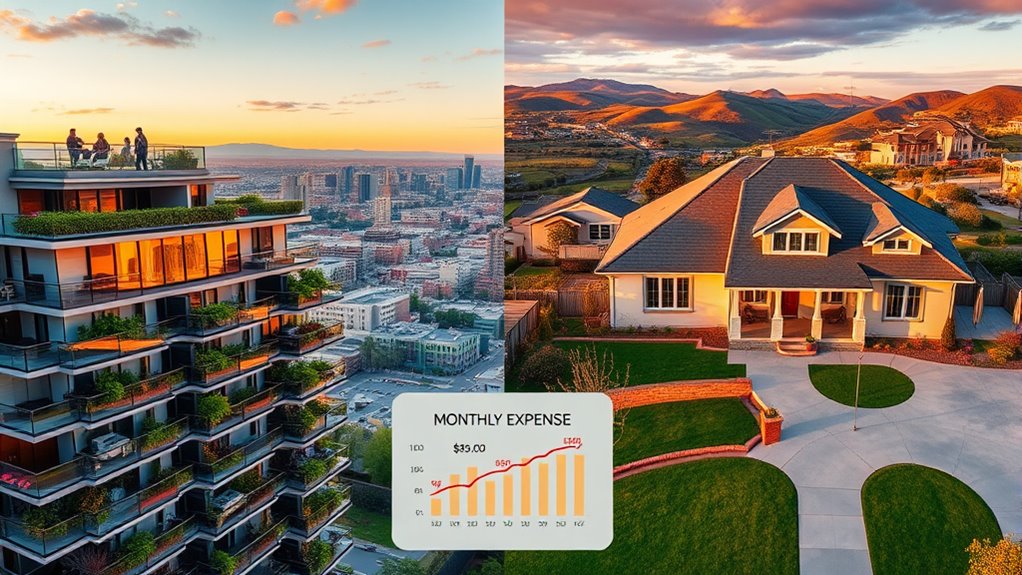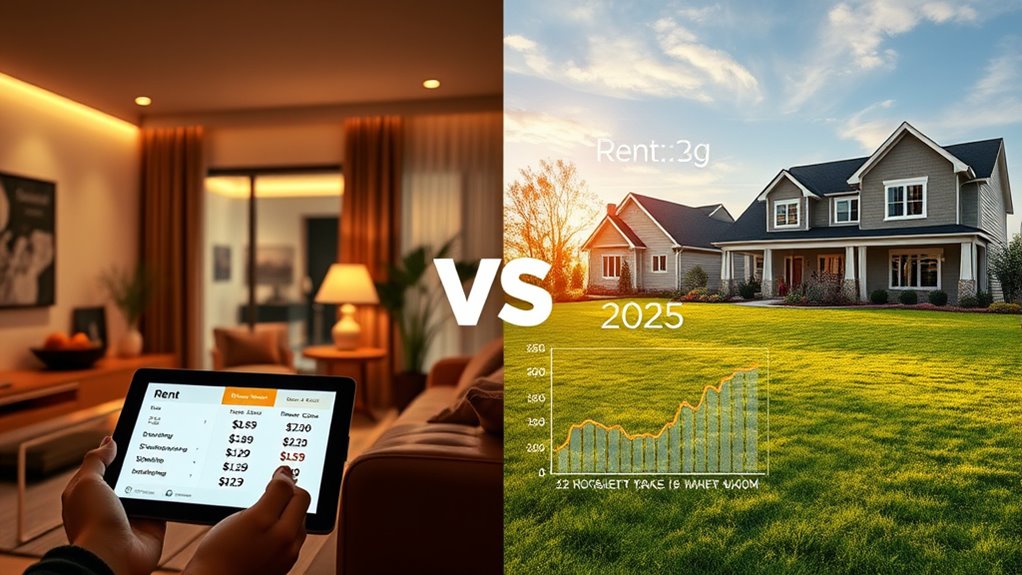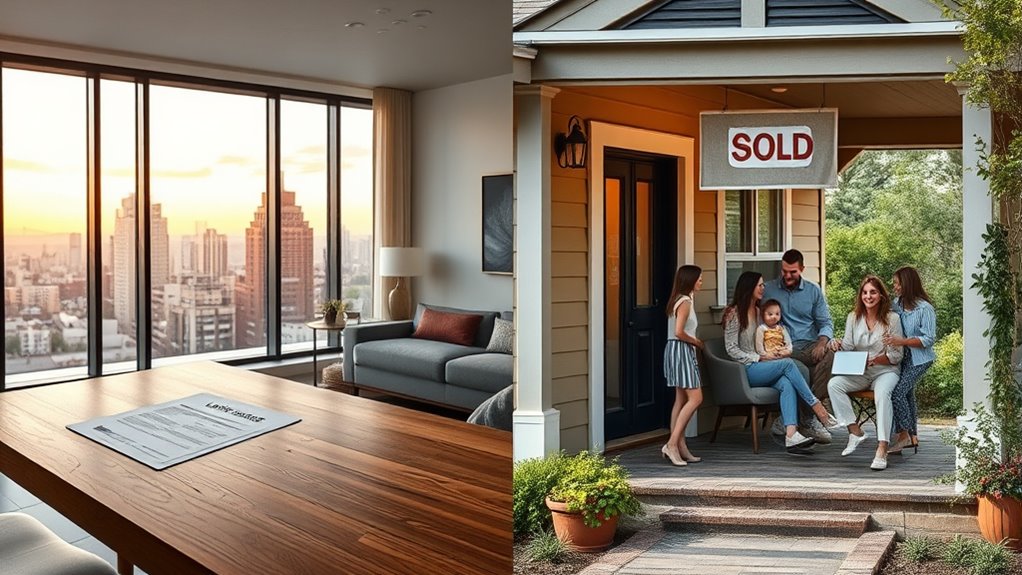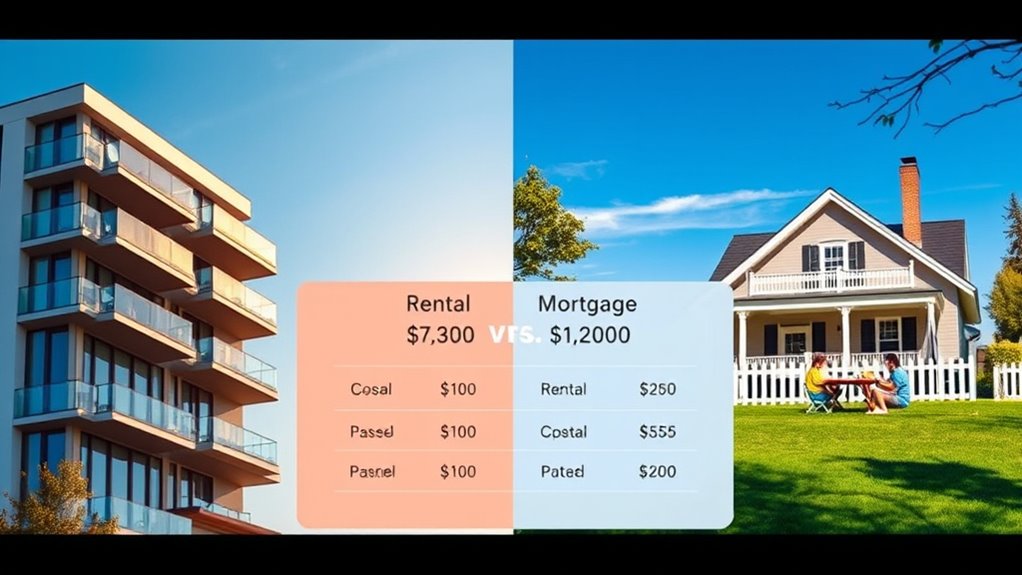In 2025, renting is typically more affordable upfront, with lower monthly costs and fewer ongoing expenses, while buying involves higher initial payments, property taxes, and maintenance. Regional differences greatly impact costs—some markets favor buying, others renting. Rising interest rates may make mortgages pricier, affecting affordability. Renting offers flexibility, but buying builds equity and long-term wealth. To make the best choice, understanding these costs and market trends is essential—you’ll discover more hidden factors ahead.
Key Takeaways
- Renting typically costs less upfront and monthly than buying, especially in high-priced markets, offering immediate savings and flexibility.
- Homeownership builds long-term wealth through equity and appreciation, but involves higher initial costs and ongoing expenses.
- Regional market differences significantly impact affordability, with some areas favoring renting due to high home prices and others making buying more accessible.
- Rising interest rates increase mortgage costs, making buying less affordable in 2025, while falling rates improve borrowing power.
- Market trends suggest high housing costs and rental stabilization, influencing the cost-effectiveness of renting versus buying in the near future.
Comparative Monthly Expenses

When comparing monthly expenses, renting is generally more affordable than buying in most U.S. markets. Rental subsidies and other homeownership incentives help keep rent costs lower, making it easier to stick to your budget. Typically, your rent will be markedly less than a mortgage payment, especially when factoring in property taxes and insurance. On average, renting can save you over $900 per month compared to buying a starter home. Plus, renters avoid costly maintenance and repair expenses, which can add up quickly for homeowners. With rental subsidies available in some areas, your monthly costs can decrease even further. Additionally, many rental properties feature industrial-inspired designs, echoing the steampunk and Victoriana aesthetics that highlight gears and mechanical elements, adding a unique style to your living space. Overall, the lower upfront costs and assistance programs make renting a more budget-friendly option for many in 2025.
Regional Cost Variations

Regional cost variations substantially influence whether renting or buying makes more financial sense. You’ll notice regional disparities in home prices, rental rates, and mortgage costs, which reflect market segmentation. In some areas, like the Rust Belt, buying can be more affordable due to lower property prices and smaller cost gaps. Conversely, tech hubs such as San Francisco and Seattle show significant differences, with high home prices making renting the more economical choice. These regional disparities mean that your decision depends heavily on your location. Market segmentation also impacts available options and affordability, shaping whether renting or buying is the smarter financial move. Understanding regional variations helps you evaluate the true cost of homeownership versus renting in your specific area. Regional market segmentation also affects the availability of financing options and the overall affordability of homeownership.
Impact of Interest Rates on Buying Costs

When interest rates rise, your borrowing costs increase, making it more expensive to finance a home. Fluctuating rates can quickly change how affordable buying feels, especially if rates climb unexpectedly. As a result, these shifts can markedly impact your decision to buy now or wait.
Rising Borrowing Expenses
Rising interest rates directly increase the cost of buying a home by making mortgage loans more expensive. When interest rates climb, your loan terms become less favorable, leading to higher monthly payments. This also limits your mortgage options, as lenders may tighten qualification criteria or limit the loan amounts available. As borrowing expenses grow, the overall affordability of homeownership diminishes, especially for first-time buyers. You might need to choose shorter loan terms or larger down payments to offset these costs. Higher interest rates also mean you pay more over the life of your loan, reducing the potential benefits of homeownership. Additionally, increased borrowing costs can influence the demand for homes, further impacting market prices. In 2025, these rising borrowing expenses are a key factor influencing whether buying remains a viable option for your financial situation.
Rate Fluctuations Impact Affordability
Fluctuations in interest rates can particularly impact your ability to afford a home. Interest rate volatility directly affects mortgage affordability, making monthly payments higher or lower depending on market conditions. When rates rise, your mortgage costs increase, reducing how much house you can afford and potentially pushing you toward renting. Conversely, when rates fall, borrowing becomes cheaper, improving your buying power. These fluctuations can create uncertainty, influencing your decision to buy or wait. High interest rates also lengthen loan terms and increase total interest paid over the life of the mortgage. Staying aware of interest rate trends helps you plan better and decide when locking in a mortgage might save you money, ensuring your homeownership journey remains financially viable. Additionally, understanding trailer music composition techniques can help you recognize the importance of sound design even in financial decision-making, highlighting how strategic planning can lead to better outcomes.
Upfront and Ongoing Financial Responsibilities

Purchasing a home typically requires a larger upfront financial commitment than renting, including a down payment, closing costs, and other initial expenses. You’ll need to budget for:
- Down Payment – Often 3-20% of the home’s price, impacting your mortgage and Homeowner Tax Benefits.
- Closing Costs – Fees for inspections, title searches, and legal services, usually 2-5% of the purchase price.
- Rental Insurance – While lower than homeowner insurance, it’s essential to protect your belongings.
- Ongoing Expenses – Property taxes, maintenance, and homeowners association fees, which can markedly add to your monthly costs.
- Cake Pop Decoration Costs – If you’re considering decorating your home or gifting, quality decorating tools and packaging can add to your initial expenses, much like the decorating tools used in cake pop crafting.
Compared to renting, these upfront costs are higher, but Homeowner Tax Benefits can offset some expenses over time.
Market Trends and Rental Price Fluctuations

Market trends indicate that rental prices are continuing to shift in response to economic conditions and housing supply. Currently, market stability remains fragile, with rental demand fluctuating based on broader economic factors. High home prices and rising interest rates have made buying less accessible, fueling increased rental demand in many areas. Despite this, rental prices have shown signs of stabilization in some markets, although others experience slight declines, especially for smaller units. These fluctuations reflect changing economic conditions and supply dynamics, impacting affordability and rental market competitiveness. As a result, you may find rental prices less predictable, with regional variations driven by local market stability. Additionally, practicing self-awareness can help renters better understand their housing needs and financial limits, leading to more informed decisions in this dynamic market. Staying aware of these trends helps you better anticipate rental costs and make informed housing decisions in 2025.
Benefits and Drawbacks of Renting Versus Buying

Renting offers you greater flexibility and mobility, making it easier to move for work or lifestyle changes. However, it often comes with higher ongoing costs and no long-term ownership benefits. Buying can build equity and wealth over time, but it requires significant financial commitments and less short-term flexibility. Additionally, understanding the true costs involved in each option can help you make a more informed decision about long-term financial planning.
Flexibility and Mobility
Because flexibility and mobility are often priorities for many people, renting offers a clear advantage in this area. When you rent, you can move more easily without the burden of property taxes or home insurance, which are typically included in your rent. This makes it simpler to adapt to job changes or lifestyle shifts. Additionally, the ability to manage cookie preferences ensures your browsing experience remains tailored to your needs while maintaining privacy.
Here are four key points:
- Renting allows you to relocate quickly, often with minimal notice.
- Buying ties you to your home, making moves more costly and complex.
- Property taxes and home insurance are the landlord’s responsibility, reducing your financial commitments.
- Renting provides the freedom to try different neighborhoods without long-term commitments.
Financial Commitments and Costs
When weighing the financial commitments of renting versus buying, it’s important to contemplate both the upfront costs and ongoing expenses involved in each option. Renting usually requires a lower initial investment, like a security deposit, whereas buying involves a substantial down payment. Ongoing costs include mortgage payments, property taxes, and maintenance—expenses that can add up quickly. As a homeowner, you build home equity over time, which can boost your net worth and offer potential financial benefits. Additionally, homeowners often enjoy tax benefits such as deductions for mortgage interest and property taxes, reducing overall costs. Understanding these costs helps you choose the option that aligns with your financial goals and stability. AI tools can also assist in analyzing market trends and estimating future expenses, aiding in more informed decision-making.
Equity and Long-term Wealth
Buying a home allows you to build equity over time, turning monthly payments into a form of long-term savings. This home equity can boost your financial stability and serve as a valuable asset. However, there are important considerations:
- You benefit from property appreciation, growing your long-term wealth as your home’s value increases.
- Building equity provides opportunities for borrowing against your home for major expenses or investments.
- If the housing market declines, your home equity could decrease, impacting your long-term wealth.
- Renting, while more flexible, doesn’t build home equity, so your wealth growth depends on other investments.
- Utilizing professional-grade products can help maintain your home’s value and protect your investment.
Ultimately, buying offers a path to long-term wealth through home equity, but market fluctuations and costs can influence your financial outcome.
Investment Opportunities With Rental Savings

If you’re saving over $900 each month by renting instead of buying, you have a valuable opportunity to grow your wealth through smart investments. Instead of tying up funds in property taxes or covering home maintenance costs, you can direct that money toward stocks, bonds, or real estate crowdfunding. This approach allows your savings to generate passive income and appreciate over time. Plus, skipping property taxes and maintenance expenses means you avoid unexpected costs that can eat into your investments. By investing your rental savings wisely, you diversify your portfolio and reduce financial risks associated with homeownership. This strategy can accelerate wealth building while maintaining flexibility, giving you more control over your financial future without the burdens of property management.
Future Outlook for Housing Costs

As economic conditions continue to evolve, housing costs are expected to remain high and potentially increase further. Market volatility and policy reforms will play key roles in shaping future costs. Here’s what to watch for:
- Rising interest rates may keep buying costs elevated, making homeownership less affordable.
- Policy reforms could introduce tax incentives or restrictions, impacting affordability and market stability.
- Market volatility might cause fluctuations in home prices, creating uncertainty in the housing market.
- Rental prices could stabilize or decline slightly due to increased supply, but high demand may keep rents elevated in many areas.
Staying informed on these factors can help you navigate the shifting landscape of housing costs in 2025.
Frequently Asked Questions
How Do Government Policies Influence Rent and Home Prices in 2025?
Government policies, like zoning regulations and mortgage policies, markedly influence rent and home prices in 2025. Zoning laws can restrict or expand housing development, affecting supply and affordability. Meanwhile, mortgage policies, including interest rate adjustments and lending standards, determine how easily you can buy a home and impact overall prices. When policies favor housing affordability, rent and home prices tend to stabilize or decrease, making housing more accessible for you.
What Role Does Economic Uncertainty Play in Choosing to Rent or Buy?
With 2025’s housing market volatility, over 60% of buyers hesitate due to economic uncertainty. Interest rate fluctuations make locking in a mortgage riskier, so you might prefer renting to avoid potential price drops or rising costs. When the economy’s unpredictable, renting offers flexibility and lower financial commitment, helping you stay adaptable until conditions stabilize. This way, you minimize risk amidst uncertain interest rates and market shifts.
Are There Tax Benefits Associated With Renting or Owning in 2025?
In 2025, owning a home offers tax benefits like deductions for mortgage interest and property taxes, which can lower your taxable income. Renting may come with rental incentives, such as discounts or credits, but doesn’t provide tax deductions. If you prioritize tax savings, buying might be more advantageous. However, if you prefer flexibility and fewer upfront costs, rental incentives can make renting more appealing.
How Might Housing Market Shifts Impact Long-Term Affordability?
Housing market shifts could drastically alter your long-term affordability, especially if urban sprawl accelerates or mortgage rates fluctuate unexpectedly. Rising mortgage rates might make buying less attractive, pushing prices higher in expanding suburbs. Conversely, if urban sprawl slows, housing supply could tighten, driving up costs. Staying alert to these changes helps you anticipate future affordability, so you can make smarter decisions about renting or buying as market dynamics evolve.
What Are the Risks of Investing Rental Savings Compared to Home Equity?
You face financial risks when investing rental savings, especially from market fluctuations. If the housing market dips or interest rates rise, your investments might lose value or generate lower returns. Unlike building home equity, which generally appreciates over time, your savings are more vulnerable to economic shifts. To mitigate these risks, diversify your investments and stay informed about market trends, ensuring your money continues to grow despite uncertainties.
Conclusion
Ultimately, whether you rent or buy in 2025, remember that “a penny saved is a penny earned.” Weigh the costs carefully, consider your financial goals, and stay flexible as market trends shift. Renting offers flexibility, while buying builds equity—choose what fits your lifestyle best. Keep an eye on interest rates and regional differences. Making informed decisions now guarantees you’re not just paying for a home, but investing in your future.










